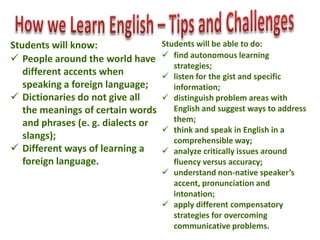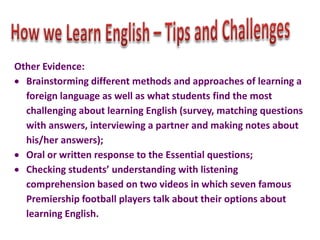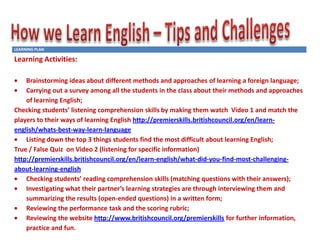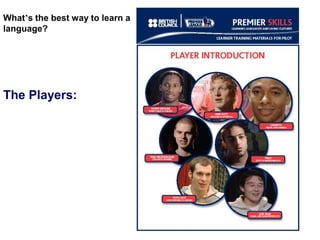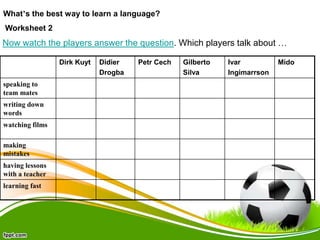How we learn english presentation - elka oct. 17
- 1. Presented by: Elka Veselinova elka_veselinova@abv.bg
- 2. DESIRED RESULTS Established Goals: Bulgarian State Educational Requirements – English as a foreign language, Intensive learning (Grade 8) Core “Speaking”, Level 2: The student uses standard language and adequate for a certain communicative situation behavior, pronunciation and intonation. If it is necessary, the student applies compensatory strategies for overcoming communicative problems. Core “Listening”, Level 2: The student understands details in conversations between native and non-native English speakers; understands authentic texts spoken on radio and TV. Common Core, State Standards – English / Language Arts (Grade 7) Speaking and Listening Standards: Comprehension and Collaboration 2. Analyze the main idea and supporting details presented in diverse media and formats (e. g. visually quantitatively, orally) and explain how the ideas clarify a topic, text, or issue under study. Presentation of Knowledge and Ideas 5. Include multimedia components and visual displays in presentations to clarify claims and findings and emphasize salient points.
- 3. Understandings: o o o Essential Questions: When speaking a foreign language, what is important is to be understood by the Why learn a foreign language? listeners and not to be afraid of making mistakes. There are various ways of learning vocabulary Why is it important not to be shy to speak in and grammar – you should choose those ones English even with mistakes? which are effective for you. When listening to a foreign speaker you should try to understand some details and words you do not know by the context.
- 4. Students will know: People around the world have different accents when speaking a foreign language; Dictionaries do not give all the meanings of certain words and phrases (e. g. dialects or slangs); Different ways of learning a foreign language. Students will be able to do: find autonomous learning strategies; listen for the gist and specific information; distinguish problem areas with English and suggest ways to address them; think and speak in English in a comprehensible way; analyze critically issues around fluency versus accuracy; understand non-native speaker’s accent, pronunciation and intonation; apply different compensatory strategies for overcoming communicative problems.
- 5. EVIDENCE/ASSESSMENTS Performance Tasks: Vratsa Foreign Language School Video Studio announces this month video contest. Create a video (2.5 – 3 min. long) describing your ways of learning English and say what the 3 most difficult things about learning English for you are. In addition, give some advice to non-native speakers why and how they should learn English. Panels of students and teachers will vote separately and independently and choose the top 3 videos. The best videos will be uploaded on our video board, send to the Premiership football players participating in the videos you have seen before and used in our School Advertising Campaign. Besides, the winners will receive special financial reward by the Headmistress and will be included in the group travelling to an English-speaking partnercountry for our next multilateral Comenius project.
- 6. Digital Storytelling : Video: How I learn English - Tips and Challenges Teacher Name: Ms. Veselinova Student Name: ________________________________________ CATEGORY Duration of Video 4 3 Length of the video Length of the video was 2.5 - 3 minutes. was 1.5 - 2.5 minutes. 2 Length of the video was 1 - 2 minutes. 1 Presentation was less than 1 minute long OR more than 3 minutes. Voice - Consistency Voice quality is clear and consistently audible throughout the video. The pace (rhythm and voice punctuation) fits the story line and helps the audience Grammar and usage were correct and contributed to clarity. Voice quality is clear and consistently audible through some (7084%)of the video. Tries to use pacing (rhythm and voice punctuation), but it is often noticeable that the pacing does Grammar and usage were typically correct but errors detracted from story. Answers in a way both - "why" and "how" but the advice in general does not seem very Voice quality needs more attention. Voice - Pacing Grammar Point of View - why and how to learn English Voice quality is clear and consistently audible throughout the majority (85-95%) of Occasionally speaks too fast or too slowly for the story line. The pacing (rhythm and voice Grammar and usage were typically correct and errors did not detract from the story. Gives complete and Gives meaningful meaningful advice advice but answers answering both only one of the "why" and "how". questions - "why" or "how". Date Created: Oct 16, 2013 02:03 pm (CDT) No attempt to match the pace of the storytelling to the story line or the audience. Repeated errors in grammar and usage distracted greatly from the story. It is difficult to figure out what advice is given.
- 7. Other Evidence: Brainstorming different methods and approaches of learning a foreign language as well as what students find the most challenging about learning English (survey, matching questions with answers, interviewing a partner and making notes about his/her answers); Oral or written response to the Essential questions; Checking students’ understanding with listening comprehension based on two videos in which seven famous Premiership football players talk about their options about learning English.
- 8. LEARNING PLAN Learning Activities: Brainstorming ideas about different methods and approaches of learning a foreign language; Carrying out a survey among all the students in the class about their methods and approaches of learning English; Checking students’ listening comprehension skills by making them watch Video 1 and match the players to their ways of learning English http://premierskills.britishcouncil.org/en/learnenglish/whats-best-way-learn-language Listing down the top 3 things students find the most difficult about learning English; True / False Quiz on Video 2 (listening for specific information) http://premierskills.britishcouncil.org/en/learn-english/what-did-you-find-most-challengingabout-learning-english Checking students’ reading comprehension skills (matching questions with their answers); Investigating what their partner’s learning strategies are through interviewing them and summarizing the results (open-ended questions) in a written form; Reviewing the performance task and the scoring rubric; Reviewing the website http://www.britishcouncil.org/premierskills for further information, practice and fun.
- 9. Welcome to the football world
- 10. What’s the best way to learn a language? The Players:
- 11. What’s the best way to learn a language? Worksheet 2 Now watch the players answer the question. Which players talk about … Dirk Kuyt speaking to team mates writing down words watching films making mistakes having lessons with a teacher learning fast Didier Drogba Petr Cech Gilberto Silva Ivar Ingimarrson Mido
- 13. What did you find most challenging about learning English? Worksheet 3 Watch Watch the players answer the question “What did you find most challenging about learning English?” Do the players mention anything you‟ve talked about? Watch again and decide if these sentences are true or false. (T or F) 1 Ingimarsson says that speaking and spelling are difficult. 2 Cech says that newspapers contain proper English. 3 Kuyt finds „scouse‟ difficult. 4 Sun can‟t find some words in the dictionary. 5 Mido thinks that lots of people pronounce words badly. 6 Cech says that expressions are easy to translate. 7 Sun still doesn‟t understand the two meanings of „boot‟.
- 14. Bye, bye For further information, practice and fun: http://www.britishcouncil.org/premierskills



